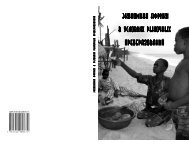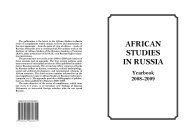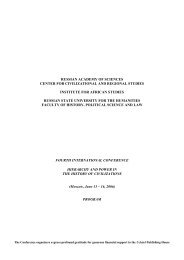L. Fituni, I. Abramova Resource Potential of Africa and Russia's ...
L. Fituni, I. Abramova Resource Potential of Africa and Russia's ...
L. Fituni, I. Abramova Resource Potential of Africa and Russia's ...
Create successful ePaper yourself
Turn your PDF publications into a flip-book with our unique Google optimized e-Paper software.
change will shape the global economic development (<strong>and</strong>, in fact,<br />
the international relations) for al least the next 50 to 70 years.<br />
It is important to emphasize that by this statement we are not referring<br />
to individual commodity markets – in which case – the<br />
‘buyer-seller’ contraposition is volatile <strong>and</strong> varies in short– to medium-term<br />
periods. We are speaking about a higher level <strong>of</strong> theoretical<br />
abstraction – about a unified category <strong>of</strong> the world market<br />
<strong>of</strong> raw materials as an element <strong>of</strong> the system that is called “Global<br />
Economy’.<br />
It is the deepening shortage <strong>of</strong> natural resources, which is one <strong>of</strong><br />
the true <strong>and</strong> fundamental reasons for the worsening <strong>and</strong> latent local,<br />
regional <strong>and</strong> global crises in the new millennium. The presence or<br />
absence <strong>of</strong> natural resources have direct effects on people's living<br />
st<strong>and</strong>ards, prospects <strong>of</strong> social <strong>and</strong> economic development <strong>of</strong> states,<br />
stability <strong>of</strong> the world economy <strong>and</strong> international security.<br />
The resources issue will dominate not only the international<br />
agenda but also the domestic one. It will remain a true underlying<br />
cause <strong>of</strong> international tensions <strong>and</strong> even wars, as well as social upheavals<br />
<strong>and</strong> revolutions within national borders.<br />
Despite all the dissimilarity <strong>and</strong> belonging to different subgroups<br />
in terms <strong>of</strong> socioeconomic development, Russia <strong>and</strong> <strong>Africa</strong><br />
are akin for being among the few remaining world regions with<br />
plentiful <strong>and</strong> not completely depleted resources (in company, perhaps,<br />
with Brazil <strong>and</strong> some regions in Asia). This fact, to a significant<br />
extent, determines their present position in the world economy<br />
<strong>and</strong> politics <strong>and</strong> makes them targets <strong>of</strong> expansion <strong>and</strong> international<br />
pressures, which will have the tendency to increase during the next<br />
decade.<br />
In these conditions the new partnerships are vital for each <strong>of</strong><br />
them, since such partnership represent alternative pillars for their<br />
sustained development <strong>and</strong> progress. Co-operation with new emerging<br />
economic centers, within the BRICS <strong>and</strong> South-South frameworks<br />
are equally important.<br />
Unfortunately, <strong>Russia's</strong> exp<strong>and</strong>ing economic cooperation with<br />
the developing countries, <strong>and</strong> particularly with <strong>Africa</strong>, is <strong>of</strong>ten interpreted<br />
as a threat by the West. The actual underlying reason for such<br />
208







